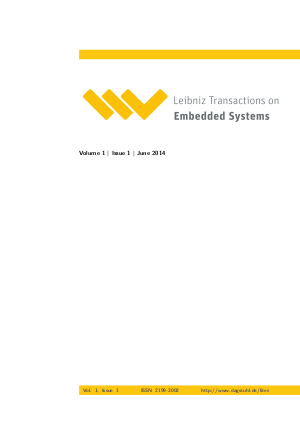Leibniz Transactions on Embedded Systems, Volume 1, Issue 1
LITES, Volume 1, Issue 1
-
Part of:
Volume:
LITES, Volume 1
Journal: Leibniz Transactions on Embedded Systems (LITES)

Editor
Publication Details
- published at: 2014-04-14
- Publisher: Schloss Dagstuhl – Leibniz-Zentrum für Informatik
- DBLP: db/journals/lites/lites1
Access Numbers
- Detailed Access Statistics available here
-
Total Document Accesses (updated on a weekly basis):
0PDF Downloads
Documents
LITES, Volume 1, Issue 1
Abstract
Cite as
LITES, Volume 1, Issue 1, pp. 1-63, Schloss Dagstuhl – Leibniz-Zentrum für Informatik (2014)
Copy BibTex To Clipboard
@Article{LITES-v001-i001,
title = {{LITES, Volume 1, Issue 1}},
journal = {Leibniz Transactions on Embedded Systems},
pages = {1--63},
ISSN = {2199-2002},
year = {2014},
volume = {1},
number = {1},
publisher = {Schloss Dagstuhl -- Leibniz-Zentrum f{\"u}r Informatik},
address = {Dagstuhl, Germany},
URL = {https://drops.dagstuhl.de/entities/document/10.4230/LITES-v001-i001},
doi = {10.4230/LITES-v001-i001},
annote = {Keywords: LITES, Volume 1, Issue 1}
}
Foreword
Abstract
Cite as
LITES, Volume 1, Issue 1, pp. 0:i-0:ii, Schloss Dagstuhl – Leibniz-Zentrum für Informatik (2014)
Copy BibTex To Clipboard
@Article{burns:LITES-v001-i001-a000,
author = {Burns, Alan},
title = {{Foreword}},
journal = {Leibniz Transactions on Embedded Systems},
pages = {00:1--00:2},
ISSN = {2199-2002},
year = {2014},
volume = {1},
number = {1},
publisher = {Schloss Dagstuhl -- Leibniz-Zentrum f{\"u}r Informatik},
address = {Dagstuhl, Germany},
URL = {https://drops.dagstuhl.de/entities/document/10.4230/LITES-v001-i001-a000},
URN = {urn:nbn:de:0030-drops-192425},
doi = {10.4230/LITES-v001-i001-a000},
annote = {Keywords: }
}
A Comparison between Fixed Priority and EDF Scheduling accounting for Cache Related Pre-emption Delays
Abstract
Cite as
Will Lunniss, Sebastian Altmeyer, and Robert I. Davis. A Comparison between Fixed Priority and EDF Scheduling accounting for Cache Related Pre-emption Delays. In LITES, Volume 1, Issue 1 (2014). Leibniz Transactions on Embedded Systems, Volume 1, Issue 1, pp. 01:1-01:24, Schloss Dagstuhl – Leibniz-Zentrum für Informatik (2014)
Copy BibTex To Clipboard
@Article{lunniss_et_al:LITES-v001-i001-a001,
author = {Lunniss, Will and Altmeyer, Sebastian and Davis, Robert I.},
title = {{A Comparison between Fixed Priority and EDF Scheduling accounting for Cache Related Pre-emption Delays}},
journal = {Leibniz Transactions on Embedded Systems},
pages = {01:1--01:24},
ISSN = {2199-2002},
year = {2014},
volume = {1},
number = {1},
publisher = {Schloss Dagstuhl -- Leibniz-Zentrum f{\"u}r Informatik},
address = {Dagstuhl, Germany},
URL = {https://drops.dagstuhl.de/entities/document/10.4230/LITES-v001-i001-a001},
URN = {urn:nbn:de:0030-drops-192432},
doi = {10.4230/LITES-v001-i001-a001},
annote = {Keywords: Real-time systems, Fixed priority, EDF, Pre-emptive scheduling, Cache related pre-emption delays}
}
TLM.open: a SystemC/TLM Frontend for the CADP Verification Toolbox
Abstract
Cite as
Claude Helmstetter. TLM.open: a SystemC/TLM Frontend for the CADP Verification Toolbox. In LITES, Volume 1, Issue 1 (2014). Leibniz Transactions on Embedded Systems, Volume 1, Issue 1, pp. 02:1-02:18, Schloss Dagstuhl – Leibniz-Zentrum für Informatik (2014)
Copy BibTex To Clipboard
@Article{helmstetter:LITES-v001-i001-a002,
author = {Helmstetter, Claude},
title = {{TLM.open: a SystemC/TLM Frontend for the CADP Verification Toolbox}},
journal = {Leibniz Transactions on Embedded Systems},
pages = {02:1--02:18},
ISSN = {2199-2002},
year = {2014},
volume = {1},
number = {1},
publisher = {Schloss Dagstuhl -- Leibniz-Zentrum f{\"u}r Informatik},
address = {Dagstuhl, Germany},
URL = {https://drops.dagstuhl.de/entities/document/10.4230/LITES-v001-i001-a002},
URN = {urn:nbn:de:0030-drops-192441},
doi = {10.4230/LITES-v001-i001-a002},
annote = {Keywords: Model checking, Verification, Simulation, SystemC, Transactional modeling}
}
Randomized Caches Considered Harmful in Hard Real-Time Systems
Abstract
Cite as
Jan Reineke. Randomized Caches Considered Harmful in Hard Real-Time Systems. In LITES, Volume 1, Issue 1 (2014). Leibniz Transactions on Embedded Systems, Volume 1, Issue 1, pp. 03:1-03:13, Schloss Dagstuhl – Leibniz-Zentrum für Informatik (2014)
Copy BibTex To Clipboard
@Article{reineke:LITES-v001-i001-a003,
author = {Reineke, Jan},
title = {{Randomized Caches Considered Harmful in Hard Real-Time Systems}},
journal = {Leibniz Transactions on Embedded Systems},
pages = {03:1--03:13},
ISSN = {2199-2002},
year = {2014},
volume = {1},
number = {1},
publisher = {Schloss Dagstuhl -- Leibniz-Zentrum f{\"u}r Informatik},
address = {Dagstuhl, Germany},
URL = {https://drops.dagstuhl.de/entities/document/10.4230/LITES-v001-i001-a003},
URN = {urn:nbn:de:0030-drops-192450},
doi = {10.4230/LITES-v001-i001-a003},
annote = {Keywords: Real-time systems, Caches, Randomization, WCET analysis}
}